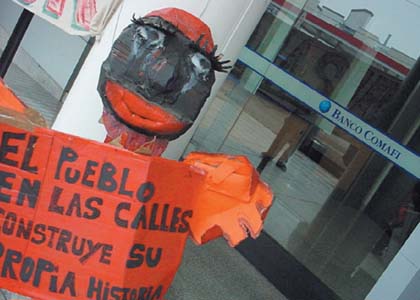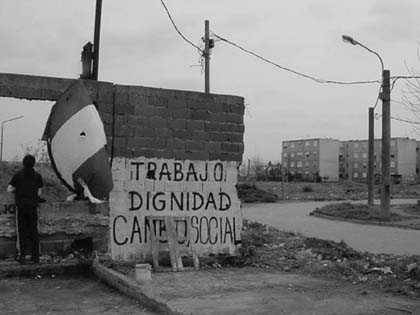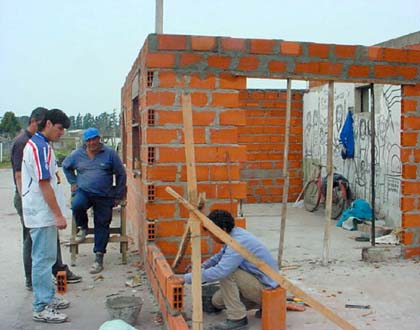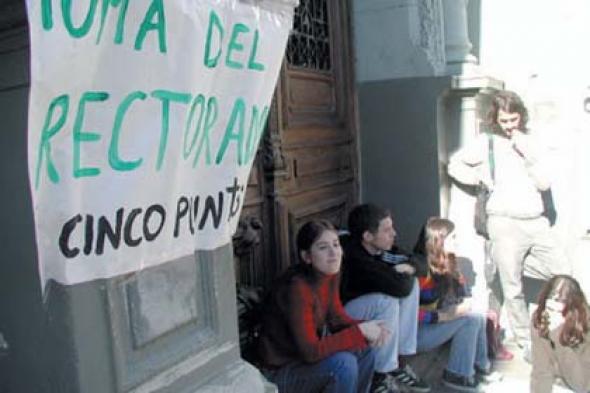Argentinian Stories
Has the planet really shrunk that much? Mute’s recent attempts to circumvent the mainstream media black-out on events in Argentina proved just how hard it still is to effect meaningful contact with far away parts. Having decided to track down people willing to write about their varied and local experiences of the economic crisis and its popular backlash in Argentina, we set to work disseminating messages via Spanish speaking friends and various Latin American mailing lists. The texts that follow are the result of this highly mediated and glitch-filled communication process. The writers, with whom contact was patchy and often deciphered through Babelfish, haven’t always been able to supply details of what they do and where they live. As a result, these texts lack the usual biographical ID tags. But what does identify them is a nearly unanimous mistrust of representational politics and a real sense of popular self-determination. Through the near collapse of the state, and ensuing success of community self-organisation, many have glimpsed the hope of an autonomic horizon. Due to the Mute network’s inevitable predetermination of the views it attracts, it remains an open question whether the disillusionment in traditional forms of government consistently expressed here is truly reflected in the views of the population at large. But, in the spirit of partiality, we offer you the following picture.
Three Snapshots of the Assemblies
Franco Ingrassia reflects on Argentina’s neighbourhood assemblies and sees them as embodying both the radical promise of selfdetermination and, conversely, the means for politicians to regain centralist control over communities
SOCIAL AUTOPOIESIS
On 19 December, after an initial moment of euphoria in the streets, I had a chat with some friends while being deafened by the sound of the masses banging their empty pots and pans. As we walked along we asked ourselves what the roots are of this new social process. They do not stem from the self-organisation or the autonomic aspirations of the movement – concepts we were already familiar with.
Later, during the gestation of the assemblies, we arrived at the following hypothesis: this is the end of politics. It is the end of the action/suppression process. It is the slow death of the nation state and the birth of new forms of subjectivity which are dissolving antagonism. There is no more room for any (fruitful) political intermediation. Today’s dominion is not state domination but mercantile domination.
The impossibility of implementing the state of siege in Argentina shows the reality of this mutation and its dead-end character. Today’s emancipation shuns organised politics and makes an unmediated return to the singularity of the socius. This phenomenon does not even qualify as bio-political, but as plainly biotic. It is a primal flow of autopoiesis, of society’s institutionalising power in itself. Our task is to make a clean and final break with the meaning, procedures and logic of politics. This radical break may be the only hope of re-establishing a fruitful relationship to the past. The only hope for reestablishing a relationship able to appropriate the emancipating legacy of the past century.
EXODUS AND DESERTIONS
In Rosario, the first self-convened neighbourhood assembly meets at the Flag’s Memorial Monument. There is a massive turn out. The partisan left believes a conquered land has opened up before its eyes. It monopolises the assembly. It speaks of ‘building a new representation’. As always, it tries to get the assembly to enshrine fragments of its programmes in its resolutions. However, from the autonomic perspective, there is a different approach. Instead of squabbling over hegemony, exodus and desertion are the answer. Week after week, the mass assistance dwindles. Nevertheless, assemblies proliferate in different parts of the city. One divides into two. A network is bred from proliferating centres. For the time being, parties have been sidelined.
TRANSVERSAL IDEOLOGY
Once these centres are organised, the problem of their articulation arises. Centralisation works as a quasispontaneous ideology. An inter-neighbourhood assembly, an assembly of assemblies, must be built. There is a return to a classical landscape: structure and superstructure. There is a return to a hierarchical organisation with different levels, to a delegated system. After the first impasse, the parties have regrouped and placed their bets on the interneighbourhood assembly. They are trying to transform it into a state assembly, into a macro-assembly with decision making powers over and above the people-in-assembly. The problem remains unsolved. The number of neighbours who think that the inter-neighbourhood assemblies in their current form are a failed experiment in co-ordination is increasing day by day. Other proposals and other forms of inter-assembly co-operation are beginning to emerge. One option is to turn the inter-neighbourhood arena into a newspaper rather than keeping it in assembly form. A newspaper to highlight and spread the diverse ‘best practices’ that this or that assembly has devised for itself and found effective. Such a paper, serving more as the vehicle for transversal action than for centralism, would allow a constant upgrading of the tool-kit each assembly has at its disposal for building its own experiences in (self) transformation. Another suggestion is to hold meetings between assemblies that are near to each other. This would allow co-ordination of concrete activities and at the same time preserve the partiality of their articulation, thus banishing any chance of a totalitarian outcome.
‘Death is a Grey Smudge Falling at Dawn’
Actor and theatre director Rodrigo Malmsten reports on the resilience of Argentina’s artistic and cultural life despite the current crisis
‘My father’s member is splintered, impaling my uterus’
The calamitous situation of our contemporary culture is the result of the nefarious era of Menem and de la Rúa. This situation has become even worse since last October. I refer to the desperation this historical vacuum has unleashed on society which is the result of the fact that no government in this country has given culture, science, education, and health the priority they deserve.
We know that developing countries must invest resources and give priority to these pillars of a civilised society. The destruction of childhood as a culture in itself is already a reality. If the current political orientation does not change, our society will not have a future. Our mirror reflections will be those of damned and macabre dancers lost in the labyrinth of a rotten and dreadful tomb.
Approximately 0.25% of the GNP is currently spent on culture. For me, this is a frightful statistic. It shows the devastating lack of support from the official institutions supposedly responsible for promoting culture. Despite all this, and through my involvement in theatre, I believe the current theatrical scene to be rich in projects arising from different aesthetic perspectives, positing diverse, particular and exquisite universes. I see other projects standing at the antipodes of official culture. This is a vast and rich panorama, despite the entire socio-political, economic, ideological and cultural backdrop. And to the chagrin of the official world, it is spreading in society.
‘The skin of my skull is withering’
Budgets, or the lack of them, have a direct and lethal effect upon artists’ work on the stage. My brief experience in directing theatre has taught me to adapt. We have found alternatives ways of doing the things we thought would be impossible because the money wasn’t there.

In theatre, everything is limited or unlimited. And the first item that is limited or unlimited is time. In circumstances like ours, creativity begins to flow and fights to admit new ideas into life. Necessity is the mother of invention. A lack of resources sharpens your wits. But, of course, this is only partially true. If it was an absolute truth, in Argentina, where four out every ten children live in poverty, where the middle class is on the way to oblivion and where everyone is a victim of the crisis, our children wouldn’t be living on the streets.
In any case, to have money and be able to work in peace would be the ideal. Sometimes lack of money makes you more creative and other times it does not. To have or not to have the money to implement a project does not determine its creativity.
Some theatres splash out unbelievable amounts of money on certain productions and sometimes the results are worthwhile. Others are dreadful. In the fringe circuit the same thing happens. There are excellent shows as well as terrible ones. When one is writing, ideas are not restricted by prejudice. The most daring or the humblest idea can be outlined and realised. Everything is possible in the intimate world of the artist. Limits dissolve and we are absolute masters of the form, of the idea. Despite the high incidence of crime and poverty, the innumerable incidents of corruption jammed in the gullet of the judicial system and the extreme poverty, something compels people to produce and keep on producing.
Rodrigo M. Malmsten is an actor, author and theatre director
The Constitutional Occasion: Between Marat and Virilio
Nicolás González Varela, spokesperson for the Colectivo NPH, celebrates Argentina’s widespread disillusionment with representational politics and seeming adoption of an exit strategyNothing is less passive than escaping. Nothing is less lacking in creativity than escaping absolutely. Nothing is less irrational than a social critique without any points of reference. Argentina and its new social movement, born from the December 2001 uprising, lives in a kairological reality (a reality defined by the critical moment of the event), in a tempo of life and rhythm with a totally new character. The fact that people not only protest loudly but in fact desert the rules of the system, shows the extent of rebellious transformation. No longer a mere ‘voice’ (demanding to be loyal to the end) but an ‘exit’.

A revolutionary cynicism with a passion for collective affairs. A new praxis bereft of theories, nullifying capitalist reproduction. The slogan ‘get rid of the lot of them’ is the furious grammar of the mob. The movement spreads itself by going out of itself and by folding in upon itself. It alters its arena of struggle and nullifies the empty autonomy of politics. Its mise en scene, its exodus and its re-valuation of all social matters, is an invention without prejudices. It is ‘using’ a constitutional imagination. The revolutionary ‘Fancy’ dreamt up by James Harrington in the 17th century that can drive the enemy’s compass crazy and instil chaos in its gothic machinery.
The ontological exodus of the popular assemblies, pickets, okupas, self-management in factories and services is an attacking form of defence. It is an indirect strategy for the seizure of power. A material and virtual abundance (with intensive investment in the internet) that sublimates itself into an extremely acute antagonism. It is Marat plus Virilio. It is 1793 in binary code. It is the value and end result of the encounter with the ‘sans-culotte’ and the web’s e-democracy. It is the micropolitical use of virtual reality and the macropolitical use of the street.
Informal, alternative, non-political networks are used against the trend and flow of the system’s entropy. The new Weltanschauung is totally negative – preferring desertion, the ‘exit rather than the ‘voice’, it gains an autonomous, anti-institutional expression that preconfigures new levels of sociability and community. For those who live ordinary lives, it means the foundation of a true ‘Commonwealth’ in which social power no longer represents a material force against the power or a representation or point of reference for the post-fordist masses – it has a real ontological and constitutive role. As Harrington used to say circa 1640: ‘The masses are wiser and firmer in their convictions than the Prince.’
It is a unity that enthrones the social instinct above the political form. It is the initial constitution of the movement as collective brain of social power. Will Oceana be born in the South? Will this open up a constitutional occasion in Argentina for the liberation of the future?
Piqueteros Power
Andrés López reports on the impressive but largely unremunerated achievements of Argentina’s Union of Unemployed Workers, more commonly known as the piqueteros
The town of General Mosconi, Salta, was one of the hardest hit by the state reforms implemented during the 1990s. Its tragedy was the result of the privatisations implemented by successive governments. Out of an economically active population of 8000, over 5000 workers have been left unemployed. Hippie, one of the founders of the Union of Unemployed Workers, (UTD), explains: ‘Because we were being driven to the margins of society, we had to struggle for our dignity and, most of all, for our children and their future.’
The UTD organises work projects aimed at securing new ‘planes sociales’ (a form of dole handed out in exchange for community work) for the unemployed. Hippie explains: ‘You start with a number of people who you aim to involve in a particular project. There may be six, ten, thirty or fourty people. Then you confront the problem of obtaining a building and other materials. Normally you would request help from small or mediumsized companies – but in some cases even multinationals. At times we have actually had to beg help from the multinationals.’
The UTD has completed around 600 projects since 1999. It has planted orchards, torn down wooden shacks, built recreational areas, built first aid stations, communal diners, laboratories, multi-functional halls, children’s playgrounds in parks and public spaces, and has completed many infrastructural and other construction projects. These schemes have all been implemented by 1,389 men and women working in exchange for the ‘planes sociales’.
Hippie continues: ‘Within a period of six to eight months, and in an area where the vast majority of homes are wooden shacks, many demollitions were completed. By contrast, the ‘New Home’ scheme promoted by the Local Council took four years to pull down a mere thirty shacks.’ Today the UTD has five brick factories. ‘When the UTD had just started’, Hippie observes, ‘the people contributed their own tools. Everything that has been achieved is largely due to the people themselves. It is an achievement of their struggle to regain their dignity and, in particular, on the part of women.
As for construction projects, the UTD has already built an ecological dumping ground that includes a plant for recycling and compacting plastic waste. Once compacted and repackaged, this plastic is then bartered for tools and equipment. Last August, Expoferia, a producers’ market opened up in Mosconi’s main square. Here people can buy the different products produced by the UTD, including the produce of the 56 orchards that are already going concerns.

‘The work of the UTD means that the province and the state have saved millions of pesos, at least here in our township’, says Hippie. Nevertheless these unemployed workers, known to the world as the piqueteros, are continually repulsed by government gendarmes whenever they demand payment of their dole. But by erecting blockades in front of oil refineries, they have forced the different levels of government to grant permanent jobs to 120 people and temporary employment to more than 2,100 workers who are now on three to six month contracts. ‘This is what struggle can always achieve’, concludes Hippie.
Argentina’s Political Laboratory
Jorge Iacobsohn on the undoing of the Argentinian State
Argentina is a country ruled by a Mafia-style political elite that has placed it within the framework of capitalist globalisation, and ‘privatised’ nearly the entire political and economic stage. It is a country hit severely by the consequences of globalisation, entailing a steep rise in unemployment and poverty but, perhaps more importantly, an inability to access or wield material and economic resources of any kind since these are now mostly in private hands.
01. Argentina, although a country on the fringes of the metropolitan world, has neither escaped the zeitgeist of ‘post-politics’ nor the post-fordist logic of economic production and its accompanying social relations. In our country, politics is associated with two practices: corruption and representation. Predictably, it speaks the liberal, non-con- flictual language of post-politics – a language inflected by the logic and jargon of the mass media and the clichés of ‘common sense’. The political mainstream is naturally averse to portraying the innovative praxis of autonomic assemblies and pickets – phenomena that break new social ground and go beyond the limits of the state and its representative mechanisms – as political activities in themselves. The dissenting cry of ‘get rid of the lot of them and do not allow them to return!’ is interpreted merely as a demand for new, more honest representatives. This political mainstream or class is made up of all the parties as a whole, including the left and the media.
02. The undoing of the Argentinian State was set in motion by a political class which is a gangster class. Recent investigations have proven that 90% of police stations are financing themselves with dirty money from drug dealers, arms dealers and prostitution. In turn, such funds help finance the politicians’ campaigns. The links between politicians and dirty business practices and the swindling of the state are well documented and there is hardly a politician who who remains untainted.
03. The clamour to ‘get rid of the lot of them’ is the way people put limits on the mafia class. This class can no longer rule by means of their electoral rotation and perhaps not even by means of a military dictatorship. The neighbourhood assemblies are political phenomena of the big cities in Argentina. They are openly attempting a redefinition of democracy that simultaneously supersedes capitalism. The same may be said of the movement of the unemployed piqueteros whose rallying cry is ‘Work, Dignity and Social Transformation’. Alongside this slogan they practice the principles of horizontal politics and anti-capitalism. They are not interested in elections or in the seizure of power.
04. Neighbourhood assemblies work hand in hand with the piquetero movement. Currently they are implementing the seizure of public and corporate buildings and spaces. They are turning these areas into what some Europeans call ‘okupas’ or peoples’ squats. All those who were once excluded from the main social services (education, housing, health, and leisure) are now being given these services by their own neighbourhood assembly. These practices are a threat to the political class. Their self-constituting legitimacy also provokes their official delegitimation. Most neighbours and piqueteros hold that politics is exclusively developed by means of their own transformative actions, independently of any ‘political option’ claiming to represent them. I am not saying that this is the only position that exists within these movements. There are also those who hold that the new movements cannot be empowered if they do not ‘make the leap into political life’. Luckily, the latter is not the leading force in autonomic political activities.
05. The practice of the assemblies and pickets constitutes a political laboratory because these are the first practices in recent history that common people can recognise as forms of creative resistance. Their creative aspect develops from their combined will to exert a dogged defence of rights, horizontal politics and direct democracy. This combined will is the political will which stands for no domination, being conscious that problems do not arise merely from ‘corrupt politicians’ but from a command relationship which is unresponsive to the grass roots of society.
06. In my view, the challenges this laboratory faces in its path of development and growth are the following: first, the ability of the people to challenge the official and media line that simultaneously sows fear in the face of chaos and promotes the electoral road as a means of bringing to a close the process that began to unfold after the December rebellion; and second, the capacity to obtain economic resources to help sustain their self-managing enterprises. These enterprises have started to reverse the direction of wealth accumulation, but capitalist rule and the market place are constraining them with the ‘law of value’ – i.e., the need to bring products to the market place, to make them competitive, etc.
Mute Books Orders
For Mute Books distribution contact Anagram Books
contact@anagrambooks.com
For online purchases visit anagrambooks.com








